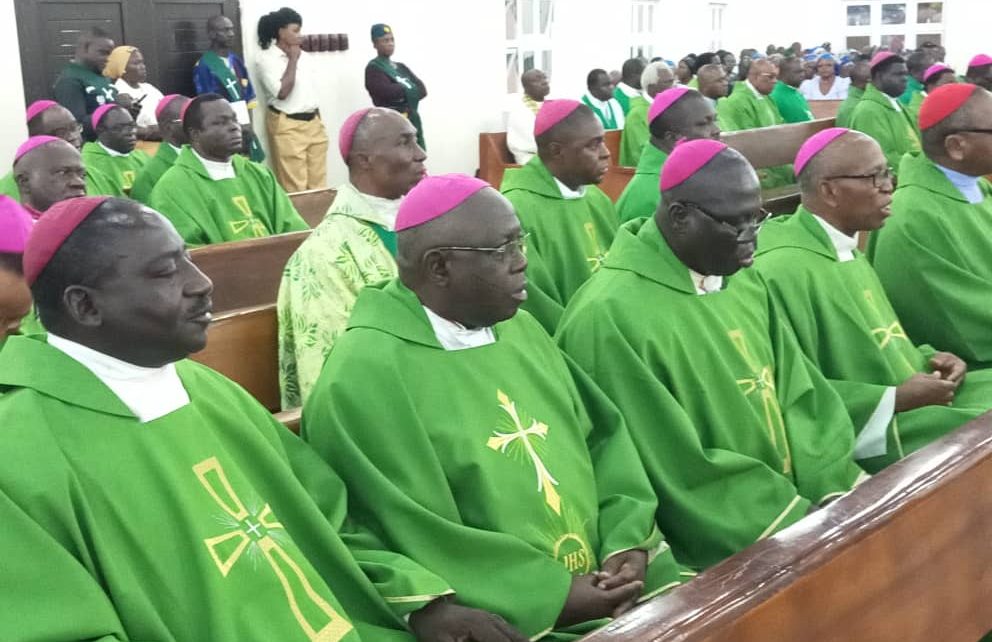Hardship: FG’s reform agenda worsening situation – Catholic Bishops
The Catholic Bishops Conference of Nigeria (CBCN) has said the reform agenda of President Bola Tinubu has added to the plight of the citizens and worsening their conditions. President of the CBCN, Most Rev. Lucius Iwejuru Ugorji, said this at the formal opening of the 2024 First Plenary Assembly of the CBCN at the Catholic […]

The Catholic Bishops Conference of Nigeria (CBCN) has said the reform agenda of President Bola Tinubu has added to the plight of the citizens and worsening their conditions.
President of the CBCN, Most Rev. Lucius Iwejuru Ugorji, said this at the formal opening of the 2024 First Plenary Assembly of the CBCN at the Catholic Secretariat of Nigeria (CSN) Resource Centre, Abuja, on Sunday.
The programme had as its theme, ‘Synod on Synodality: Areas of Concern for the Church in Nigeria’.
Ugorji said with the end of the fuel subsidy regime and the unification of the foreign exchange market, there has been a significant increase in the pump price of petroleum products and a steep decline in the value of the naira, thus increasing the hardship experienced by Nigerians.
Ugorji said rising inflation has made it difficult for average Nigerian to access basic commodities, including food items and medication.
- Akpabio: Emefiele left Economy In Terrible shape, We Don’t Know What To Charge Him With
- Plateau APC Publicity Secretary gunned down
“The reform agenda of the present government has added to the plight of Nigerians.
“With the withdrawal of fuel subsidy and the unification of the foreign exchange market, there has been a sharp increase in the pump price of petroleum products and a steep decline in the value of the naira. Indeed, there is a free fall in the national currency.
“As a result of the government’s reform agenda, millions of Nigerians have been reduced to a life of grinding poverty, wanton suffering, and untold hardship as never before in our national history.
“In a bid to survive, an increasing number of the poor have resorted to begging. With more than 80m Nigerians living below the poverty line of less than two dollars a day, our country, according to the recent disclosure of the World Bank, is the world’s second-largest poor population after India.
“While many impoverished Nigerians continue to suffer and die as a result of the hardship caused by the government’s economic reforms, the president has continued to urge the populace to make even more and more sacrifices with the assurance that brighter days lay ahead,” Ugorji said.
The CBCN President noted that as the government demands additional sacrifice from the struggling masses, Nigerians are expecting to see a drastic cut in the cost of running the government at all levels.
He said, “On the contrary, it is worrisome to watch top government functionaries live by the sweat, toil, and tears of the poor. They continue to spend huge public funds on ostentatious and luxurious lifestyles and seem incapable of feeling compassion for the outcry of the poor.
“It is no less worrisome to note that corruption among many public servants has gone beyond scale and measure. Corruption is a complex reality involving moral rottenness, defilement, and loss of integrity.”
On insecurity, Ugorji said despite the huge sums of money appropriated monthly as security votes, communities have continued to experience persistent insecurity.
He said recently that there has been an upsurge in kidnapping for ransom and increasing incidents of senseless bloodshed across the nation.
“Unarmed citizens are brutally slaughtered on our highways, in their homes, and even in the sacred precincts of places of worship. Killer herdsmen, bandits, and unknown gunmen seem to be on the rampage.
“Many communities across the nation have been taken over completely by criminals. Families have lost their ancestral lands to armed invaders and land-grabbers. The social and economic lives of communities have been paralysed due to insecurity.
“Schools have been shut down, and children can no longer continue their education. Farmers are unable to access their farms out of fear of either losing their lives or being kidnapped,” he said.
